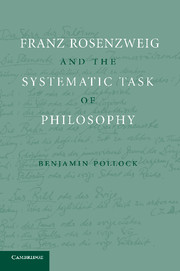Book contents
- Frontmatter
- Contents
- Acknowledgments
- Introduction: The Star of Redemption as “System of Philosophy”
- 1 System as Task of Philosophy: “The Oldest System-Program of German Idealism”
- 2 “A Twofold Relation to the Absolute”: The Genesis of Rosenzweig's Concept of System
- 3 Alls or Nothings: The Starting-Point of Rosenzweig's System
- 4 “The Genuine Notion of Revelation”: Relations, Reversals, and the Human Being in the Middle of the System
- 5 Seeing Stars: The Vision of the All and the Completion of the System
- Conclusion: The All and the Everyday
- Bibliography
- Index
Conclusion: The All and the Everyday
Published online by Cambridge University Press: 28 July 2009
- Frontmatter
- Contents
- Acknowledgments
- Introduction: The Star of Redemption as “System of Philosophy”
- 1 System as Task of Philosophy: “The Oldest System-Program of German Idealism”
- 2 “A Twofold Relation to the Absolute”: The Genesis of Rosenzweig's Concept of System
- 3 Alls or Nothings: The Starting-Point of Rosenzweig's System
- 4 “The Genuine Notion of Revelation”: Relations, Reversals, and the Human Being in the Middle of the System
- 5 Seeing Stars: The Vision of the All and the Completion of the System
- Conclusion: The All and the Everyday
- Bibliography
- Index
Summary
After having led his readers out through the concluding “Gate” of the Star “into life,” Rosenzweig was famously adamant about turning his own sights away from the writing of books and toward everyday life. In the very letter in which he introduced the Star to Martin Buber in August 1919, Rosenzweig already declared, “I see my future only in life, no longer in writing,” and explaining his decision, a year later, not to pursue an academic career, he wrote to his Doktorvater, Friedrich Meinecke, “No longer the writing of books [but rather] the little, often very little ‘demands of the day’ … have become the beloved content of my life.” Although Rosenzweig would yet engage in some important book writing after the publication of the Star – most notably his Yehudah Halevi book of 1924 and his Bible translations with Martin Buber – much of what remained of his short, illness-plagued life was indeed devoted to what might be called the “everyday” concerns of Jewish communal life in Frankfurt. It is tempting to interpret Rosenzweig's turn away from book writing after the publication of the Star as a rejection of the systematic task of philosophy he undertook in it. Perhaps here at long last, one might surmise, we find the Rosenzweig who rejects system for the sake of dialogue, totality for alterity, philosophy for religious life – the Rosenzweig, that is, whom so many scholars have sought to identify even as the author of the Star itself.
- Type
- Chapter
- Information
- Franz Rosenzweig and the Systematic Task of Philosophy , pp. 312 - 316Publisher: Cambridge University PressPrint publication year: 2009



